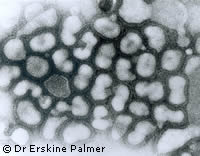Copper could stop spread of flu
A new study has provided what could be a cheap and effective way to limit the spread of both common viruses and bacteria - copper. Researchers from the University of Southampton in the UK have found that the metal is extremely effective in eliminating flu (influenza) viruses, the family of viruses which includes the so-called avian flu. The researchers, Professor Bill Keevil and Dr Jonathan Noyce, planned to publish the results later in the year. 'The results were so pertinent to the current concerns about containing a potential outbreak of the avian flu strain, that we felt it important to provide some of the preliminary results at this time,' said Professor Keevil. The researchers placed 2 million active units of Influenza A (H1N1) virus on both a sheet of C11000 copper (pure sheet metal), and a sheet of S30400 stainless steel. The viruses did not fare well in either case - on the steel sheet the viruses declined to 500,000 units after 24 hours. Meanwhile, on the copper sheet, all but 500 viruses had been rendered inactive after just six hours - a 99.9 per cent reduction. Professor Keevil indicated that the so-called avian flu (H5N1) virus is a very close relative of H1N1, and that the action of copper ought to be effective against both strains. He believes that copper attacks the very integrity of the virus, and that the effect should be broad. Prof Keevil points out that copper has already been demonstrated as effective against E. coli, MRSA and listeria bacteria. He suggests that influenza and bacteria-resistant fabrics could be woven using copper stands, or by adding copper to filters, but that such products may have a limited shelf-life due to the reduced quantity of copper compared to a solid lump. Another innovation would be to use uncoated copper or copper alloys on door handles and other commonly touched surfaces - classic areas where infection can be spread easily. 'Door knobs and handles, push plates, countertops, sinks and other frequently touched hardware in healthcare and other public facilities are prime candidates for use of copper alloys to help control the spread of infection,' said Prof Keevil.
Countries
United Kingdom



